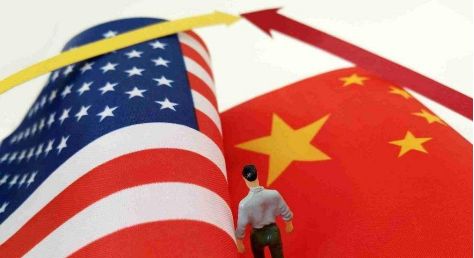More than a dozen American companies, including Apple, Ford, Disney, Wal-Mart, Procter & Gamble, Intel, MetLife, Goldman Sachs and Morgan Stanley, express their concern over the US government’s plan to restrict commercial transactions involving Tencent WeChat, saying that this move would reduce the competitiveness of enterprises in China, the world’s second largest economy. According to statistics, the market value of these companies is over 3.5 trillion US dollars, and their objections are vital. Companies that express objections are basically listed companies, or public companies, and their performance is linked to the income of millions of American investors.
Hence, Trump responded to the issue. “This is a matter of national security”, he once again gave an unwarranted reply to the concerns of American companies. This is typical Trump style. His answer is old fashioned: Bypass the question and say only the words he agrees with. If it is really difficult to answer, there are two idiomatic expressions: Next one, or Fake news.
Although Trump pretend to be calm, these companies cannot. Similarly, ordinary Americans who hold shares in these companies can’t feel at ease. If the executive order comes out as scheduled, Apple alone may be overwhelmed immediately. According to the survey carried out by a Chinese research company, if iPhone can’t run WeChat, then 95% of iPhone users will give up Apple.
What does this mean? According to reports, the Chinese market accounts for about 20% of iPhone sales. Mr Cook is not the only one who knows what it means to lose 20% of Apple’s sales.
This is only a matter of commercial consideration. WeChat is an instant message app. Many people of Chinese background in the United States are keeping in touch with relatives and friends in China through this application. How much is the quantity? It will be in the millions.
Since United States is an immigrant country, it is human nature that immigrants always keep inextricable links with their ancestral home. Asian Americans do not account for the mainstream of the American population. There are only a few million Chinese. However, can the emotional needs of millions of people be ignored?
Perhaps, this rhetorical question really has an unexpected answer. The answer can be found in Trump’s attitude and means towards ethnic minorities and all the protesters when he coped with the protests of George Floyd some time ago.
The above is just the impact of the Trump administration’s ban on WeChat, which has affected so many companies and ordinary investors.
However, Huawei is the Chinese enterprise that is far more seriously restricted than WeChat. Huawei is busy dealing with sanctions under great pressure. Is Huawei the only victim? A few days ago, Qualcomm, an important partner of Huawei and a giant in the chip industry, expressed its position. Earlier this month, the Wall Street Journal reported that Qualcomm believed that Huawei would not be affected by the US export ban, but that the US market with an annual value of US$ 8 billion would be lost to overseas competitors.
Cao Dewang, China’s glass giant, has many factories in the United States. The documentary American Factory with him as the hero won the Oscar. Cao Dewang once said in an interview: It’s hard to understand why America has to fight a trade war. “In Sino-US trade, it is the U.S. that benefit the most.”
Why is Trump so fierce and radical towards China? There are two time points associated with the answer. In mid-March this year, the number of confirmed cases in COVID-19 in the United States was far less than that in Italy and Spain. Trump even praised China’s anti-epidemic achievements at the press conference, saying that “the data and experience shared by China to the United States are very helpful, and the epidemic control effect in China is ideal. “It can be seen that his attitude towards China was mild and even favorable.
Since the pandemic swept across the United States, and the Trump administration failed to respond effectively, making the United States the country most affected by COVID-19 in the world. Regarding the number of people infected and the number of people killed by the pandemic, U.S. far exceeds that of other countries. What is the cause? Are medical conditions backward in America? Is the production capacity of pandemic prevention materials backward in America? If neither, the answer can only be the failure of the public policy formulated by Trump administration.
With the pandemic, Trump’s China policy has become increasingly fierce. A series of statements and practices that stimulate China emerge one after another: “Chinese virus”, questioning the transparency of China’s pandemic; After that, the issue against China began to be not limited to the pandemic. The South China Sea, Hong Kong, Xinjiang, Taiwan, the closure of the Consulate General in Houston, increasing sanctions against Huawei, ByteDance, and WeChat, and military provocations come out one after another …
This is why. The answer also relates to another time point: Presidential election in November. Before March, Trump’s performance in the first term had many remarkable points: The growth of US stocks, the considerable decline of unemployment rate and so on. In the election campaign, which has always focused on economic issues, Trump has firmly taken the initiative. At that time, the mainstream opinion in the United States judged that Trump’s competitor Biden had little chance of winning.
Now, the polls show that Biden continues to lead Trump. In this situation, Trump once again made shocking remarks two days ago: “If Biden is in power, all Americans will have to learn Chinese, and China will rule the United States …”
During these two time points, a series of operations all clearly point to a fact: Manipulating China is a means of Trump’s campaign. Making issues and transferring contradictions are all his familiar methods.
Who will pay for this series of operations of Trump administration? A general and direct answer is Sino-US relations. Of course, all relationships involve more than one party. In the mutual integration of China and the United States, “Chimerica” has long been a hot word. In the high integration of the two largest economies, not only ostensibly Chinese enterprises lose, but also American enterprises and people suffer. The above-mentioned cases of American enterprises opposing sanctions against WeChat and Huawei are the evidence.
The world economy is mired down in mud because of the pandemic. Who can drive the world economy best? The answer would be China. China has achieved pandemic control results. Historically, China reversed the global financial crisis with strong means in 2008. Should the United States and Americans not use this driving force because of confrontation and hostility towards China? The decision is depended on American politicians and Americans.
When Trump was elected for the first time, the agricultural state contributed a lot of effort. In Sino-US trade negotiations, American soybean is also a high-frequency word. In fact, it is China’s strong import demand that increases the income of a large number of American farmers. If Sino-US relations deteriorate, both high-tech enterprises in Silicon Valley and agricultural States in central America will suffer. Hence, if Trump calls out “Let America be great again”, how many people would believe it?
(Syndicated content)
Read more:
Our Lockdown Is Nothing Comparable To This 87 Year Long Night Curfew In Pune




































